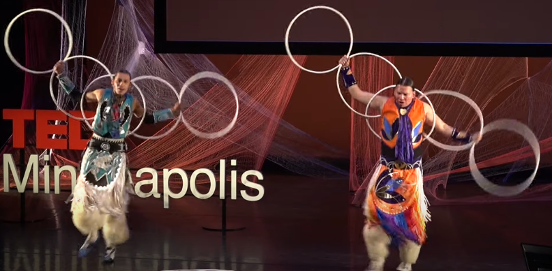Seminar Blogs
“Plant Dramaturgy” – Naomi Tidball
“What does new materialism tell us about the Anthropocene? It means that, despite a new label, we have always profoundly influenced (and been influenced by) the earth system, simply by being a part of it…We have been, and continue to be, since our creation, part of an interconnected, complex and dynamic web of materiality. Our perception of the material world as solid and unchanging is just that—a perception.” (Benson 2019, 260)
In November 2020, Transmission in Motion hosted a seminar with Manuela Infante. The seminar focused on Infante’s creative development of Estado Vegetal (Vegetative State); a theatrical performance that explores the human relations and logics of plants (Utrecht University 2020). A new materialist approach appears as both an intriguing and bold aspect in Infante’s thoughts and creativity in Estado Vegetal, and in future works. As an approach, new materialism offers a departure from a Western thought of materialism; instead, materials are transitional, changing form, and relational (Benson 2019, 257). In Estado Vegetal, we can see the influence of new materialism by the insertion of plant neurology and performance via the system of ‘branching out.[1]’ (Infante 2020). Infante’s incorporation of plant neurology and system of movement reminds me of the various cultural and ceremonial dances performed by several Indigenous groups from my home country, Canada.
There are several similarities between the approach of new materialism and Indigenous Ontologies. As both approaches offer the framework of connectedness, and these ontologies assess the relations between nature and humanity in unison; Indigenous ontologies offer interconnections based on the balance in an ergonomic form. As a traditional method of healing and ceremony, many Indigenous dances also highlight an ethical narrative of the world. At a Ted Talk in 2019, The Sampson Brothers spoke about the importance of the Indigenous Hoop Dance:
“…in Western learning, they define a hoop as a circle with infinite sides and infinite angles… and in our indigenous cultures we very well teach the same thing, it is perpetual, it has no beginning, it has no end.” (The Sampson Brothers 2019, 00:02:00-00:05:00)

The Sampson Brothers further explain that the hoop represents all aspects of life on an even plane; instead of treating life on a topographic scale, the hoops represent an equal scale of responsibility and importance (The Sampson Brothers 2019). In connection with Infante’s method of a branching tree, the hoop dance incorporates the element of performance and visual storytelling to reiterate the importance of balance; by connecting multiple hoops, performers create an imagery of different elements within our world.
Despite the limitations—word count— in exploring these topics, my goal for this blog was to highlight aspects of Indigenous ontologies and cultural practices and their similarities to a new materialist approach. Both Infante’s Estado Vegetal and the Hoop Dance in Indigenous cultures signal a change from the perception of binary oppositions—Human and difference, and Human vs. Nature. Alternatively, they mention the focus for an interconnectivity of nature and humanity. A further study could assess how these approaches achieve a possible transition towards a decolonialization.
[1] In Infante’s Estado Vegetal, the performance is based on the system of a tree branching out, Infante utilizes this plant process as a method to show the shift and growth from one story/narration to another one (Infante 2020).
References
- The Sampson Brothers, “How Indigenous Hoop Dancers See the World” TEDxMinneapolis, 2019. 00:15:40 https://www.youtube.com/watch?v=uaZbaPQnXE0&t=465s
- Benson, Melinda H. 2019.”NEW MATERIALISM: AN ONTOLOGY FOR THE ANTHROPOCENE.” Natural Resources Journal 59, no. 2: 251-80. Accessed December 1, 2020. doi:10.2307/26800037.
- CIM/Ae 2017. ESTADO VEGETAL de Manuela Infante”. Accessed: November 28, 2020. Vimeo video. 1:21:38.https://vimeo.com/252358003.
- Utrecht University. 2020. “Transmission in Motion Seminar (2020-2021): “Plant-based Dramaturgy” – Manuela Infante (theatre director, Santiago de Chile).” Transmission in Motion (blog), Utrecht University. November 25, 2020. https://transmissioninmotion.sites.uu.nl/transmission-in-motion-seminar-2020-2021-plant-based-dramaturgy-manuela-infante-theatre-direct or-santiago-de-chile/.
*Image credits: The Sampson Brothers, “How Indigenous Hoop Dancers See the World” TEDxMinneapolis, 2019. 00:13:12 https://www.youtube.com/watch?v=uaZbaPQnXE0&t=465s

